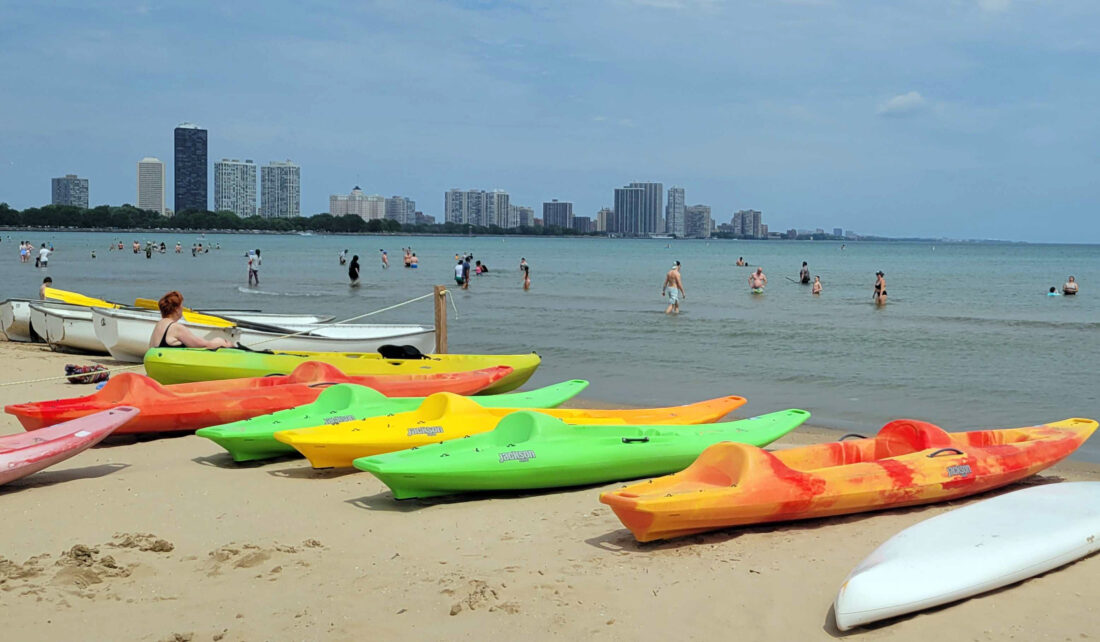
Summer 2024 is officially underway and if it’s summer, it’s intern season at Illinois-Indiana Sea Grant (IISG). Every year since 2011, we have hired college undergrads to spend the summer working closely with our specialists and taking part in other learning opportunities.
This year five interns have joined us and they will work in a variety of areas including sustainable land use planning, water resources and economics, green infrastructure, and environmental education.
Two additional interns were hired through Sea Grant’s national Community Engaged Internship program that aims to broaden participation in water resources by offering paid internships to undergrads from under-resourced, underrepresented and/or indigenous and tribal populations. We are collaborating with the National Park Service and Chicago Wilderness to co-host these two interns.
Summer is also prime time to think about water safety as the hot weather kicks in and many of us head to the beach. IISG has developed a four-part video series in partnership with the Indiana Dunes National Park to encourage safe recreation in Lake Michigan. The videos explain dangerous waves and currents and even cold-weather concerns and provide sensible safety tips. And don’t forget to check with our buoys for up-to-the minute lake conditions before you head out.
In Illinois state parks and other natural areas, conservation police officers are up to speed this summer on aquatic invasive species (AIS)—they have new knowledge and tools to combat the spread of these species and protect the state’s natural resources. Recently, 150 officers attended a hands-on workshop that was developed by our AIS team in collaboration with Carena van Riper’s lab—she’s a conservation psychologist at the University of Illinois. Through this training, the officers were able to directly engage with various AIS specimens and they learned how to distinguish between native and invasive species.
In the latest issue of Outdoor Illinois, an Illinois Department of Natural Resources online journal, you can read an update to an ongoing study to track fish in the busy downtown waters of the Chicago River and connected waterways. The team from IISG, Shedd Aquarium, and Purdue University Department of Forestry and Natural Resources is seeing some impacts on fish movement from the river’s combined sewer overflows. For example, last summer when, in response to a large rainstorm, raw sewage was pumped into Bubbly Creek, acoustically-tracked fish rapidly left this area and did not return throughout the summer.
In IISG staff news, we welcome Julie Fiorito, our new K-12 education specialist. The focus of Julie’s work is to increase Great Lakes literacy among Illinois and Indiana youth through development, delivery, and evaluation of science-based educational programming. Fiorito has extensive experience as a high school teacher planning, directing, and coordinating various educational programs. She earned a Bachelor of Science in biology education from Illinois State University and a Master’s from the University of Illinois.
Kayla Wright is our new community resilience extension specialist. A new member of Kara Salazar’s Sustainable Community Planning Team, Kayla will use her local government and community engagement expertise to provide leadership and support to further efforts with the Great Lakes Environmental Justice Thriving Communities Technical Assistance Center and the Indiana Renewable Energy Planning and Technical Engagement Collaborative. She has a bachelor’s degree from Indiana University.
Summer brings a round of educational opportunities for us to share with residents, decision-makers, educators, and partners too. Some examples:
- Registration opens on July 1 for the American Citizen Planner Indiana fall session. This 16-week course develops knowledge and skills for residents, including advisory plan commissioners or citizen advocates, who are unfamiliar with the concepts and regulations of local government planning.
- The IISG education team will engage 5−12 grade educators in a workshop on July 24−25 at the Wild Mile along the Chicago River. Participants will hear about the history and ecology of the site, as well as learn water quality testing skills to bring back to their students.
- Do you want to know more about local watershed concerns and volunteer to help keep them healthy? You can register until August 14 to join the Illinois-Indiana Master Watershed Stewardship Program class, which will take place at Purdue University Northwest from August 20 to October 8.
- On August 10, come ready to help remove rusty crayfish from the Fox River in Illinois’ Kane County at the annual Rusty Rodeo. Our AIS team will be joining in the festivities to share information about invasive crayfish.

